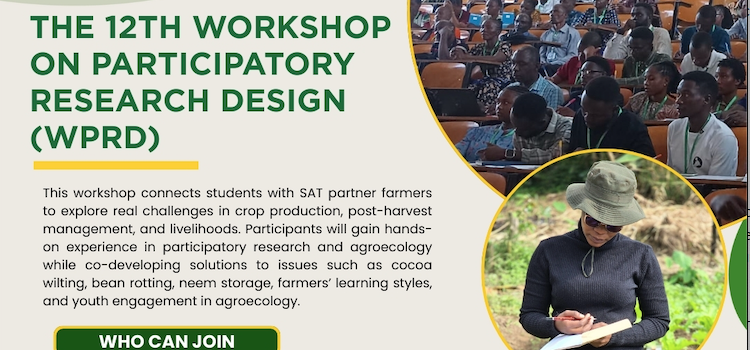Digitization & Farming: How SAT is changing livelihoods
We are living in a digital age. The internet has become a key part of our lives; it determines how we interact with one another, how we do business and how we plan our lives among many other things. The key for any business in this environment, is to leverage these new technologies to our benefit and to the benefit of our stakeholders.

At Sustainable Agriculture Tanzania our vision is for the majority of farmers to use acknowledged agroecological farming methods to improve their livelihoods, conserve the environment and reduce pressure on natural resources. To reach this goal effectively, digitization must be a key element in our approach.
Digitization at SAT largely depends on the Information and Communication Technologies (ICT) component established at SAT. The SAT ICT component is a component introduced by SAT to solve the problems that face smallholder farmers such as lack of markets, lack of information, lack of timely support and assistance in problem solving. SAT ICT employs various tools to ensure that farmers focus more on production which will ultimately lead to an increase their profits.
Farmers always need to make key decisions such as what to grow, how to grow, when to grow, where to sell, what quality is required, when to sell, what price to charge etc… Strengthening our smallholder farmers’ access to timely and accurate information improves their productivity as well their bargaining power and understanding of marketing functions which improves farmers’ market share.

The tools used by SAT ICT include mobile applications and services that help us, help farmers. The first stage involved in the digitization process is training our farmers on how to use smartphones and applications that are essential in information sharing. Some of the mobile applications used include WhatsApp and Machosauti. How did you learn how to use a smartphone? Let me guess, you played around? That is exactly the way we train our farmers through engaging them in interactive games where they use WhatsApp and other software to solve problems, such as finding the best prices or the best solution for a farming problem.
WhatsApp is a mobile application which is used for general communication purposes and media. Media such as text, pictures, audio, and videos can all be shared using this platform through the internet. First, we wanted all our farmers to share their challenges. That almost did not happen. Instead farmers started by sharing their successes, which, turned out to be a positive in itself, as it motivated other farmers to copy their ecological farming methods. However, there are still some burning questions out in the field.
Machosauti is another mobile application developed by Dr. Eugenio Tiselli and financed by SWISSAID in Tanzania. It involves media exchange in the form of text, audio and pictures as well as a webpage interface for interaction between users of the application. Here farmers are invited to upload challenges which later will be responded to by other farmers and technical experts from SAT. The benefit of this app is that farmers can later access all the solutions since they are saved for long-term use. This is its benefit when compared to WhatsApp.
However, for quick knowledge exchange WhatsApp is still the unbeatable favorite for small scale farmers. An example of one group managed on this app is ‘’Wakulima Kilimo Hai’’ (in English the “Organic Farmers”). This WhatsApp group includes 43 farmer groups, seven marketing scouts, and a plenty of SAT facilitators who act as technical consultants. In total, we have 93 farmer groups on WhatsApp, reaching, at present, more than 2740 farmers.



Apart from learning the best organic farming methods, farmers are also longing for marketing information. Currently we have market scouts from seven different markets named Tawa, Mkuyuni, Kinole, Mwazo Mgumu, Mjini, Kariakoo and Kiroka. They are responsible for collecting market information on price variation for different products (spices, vegetables, fruits, pulses, and cereal products) on a weekly basis. Market scouts are provided with smart phones, enabling them to collect market information and share it with farmer groups. We at SAT wanted to ensure that prices for up to 40 products are efficiently shared from several markets, the first option was to do so through an app. Due to high costs, however, we decided to use an alternative way which is a mix of analog and digital components building on the existing software; WhatsApp.
The approach is simple but effective; market scouts use a printed template which they fill out on the market day with all the respective prices. From the piece of paper, a picture is made, and this is the point where analog turns digital. The information is then shared on the WhatsApp where it can be accessed by hundreds of farmers. Farmers immediately see the current prices and can call the market scout to ensure there is demand for their products. SAT collects the data and builds a database of years’ worth of information which helps to advise farmers as best as possible. Our experience has shown that prices can fluctuate highly between markets. Therefore, sometimes incurring a higher transport cost can lead to much more profit through selling it at a more profitable market. We, at SAT, are committed to improving and expanding by adding more market scouts to the Dar salaam and Dodoma markets.
Financial services is another key element of our SAT ICT component. Smallholder farmers are a major part of the population in Tanzania as it relates to the agricultural sector. Unfortunately, they are usually excluded from formal financial services. Digital financial services via mobile money technology represent an opportunity to enable financial inclusion among this group.

One avenue for facilitating this is to digitize the agriculture value chains that some smallholder farmers are a part of. This provides a secure movement of the cash the farmers are paid through mobile money services. This ensures their security as well as preventing the need for farmers to move from their localities to receive payments. This system is faster, easier, cheaper, and more secure than the conventional system where they needed to move, incurring more costs in the process. Currently mobile money is used as the payment method for farmers who are producing various products. Briefly summarized this is all revolutionary technology which allows coops and farmer groups to work on a highly transparent level which is key to success.
With all these initiatives it is necessary to know where we stand. We measure our impact through collecting data with using the online app KoboToolBox. By using this technology, we have all information on the “cloud” ready to be analyzed with our statistical software.
As technologies and digitization continues to grow and shape our world. We will look to grow with it, prioritizing our farmers and their needs, leading us all to a future with is not only digital but also 100% organic.


.jpg)



